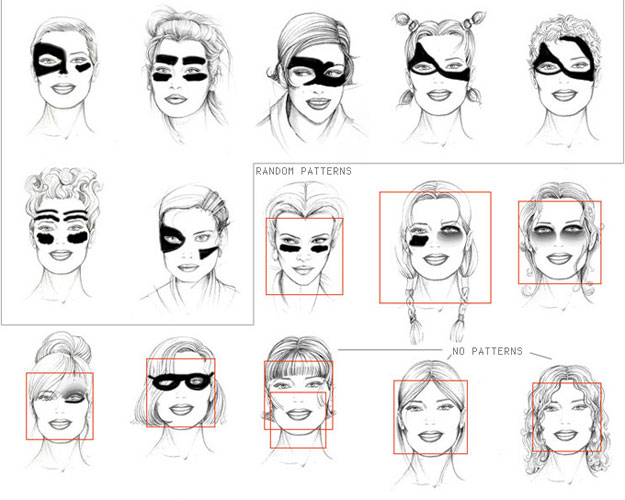I’ve learned you have to be careful when you get lost in an idea. As an artist, you have to get a little lost. Otherwise you won’t discover anything interesting. But you have to avoid getting so lost that you’re unable to walk away and keep exploring. Media artist Kyle McDonald writes about the aftermath of his People Staring at Computers Apple Store project that drew attention last summer after he was investigated by the Secret Service.
Tag: privacy
-
Kyle Mcdonald on Getting a Little Lost
-
CV Dazzle

Technologist Adam Harvey explores using dazzle camouflage makeup to thwart facial recognition libraries like OpenCV in his thesis project CV Dazzle (red squares in image denote the drawings that were successfully identified by the software as faces). Summary article over at PopSci.
(Via Discover)
-
This Creative Destruction Began in the 60s As
This “creative destruction” began in the ’60s, as did many things that we now both love and regret, and it was initially a spinoff of a project funded by US military agencies. […] Mephistopheles came to Faust in the form of a poodle. After all…in some versions of the story, he cannot enter your house unbidden — you have to invite him in, like a vampire. From Internet Antichrist, a thoughtful piece by David Byrne on the the development of the ARPANET, psychoacoustics research at Bell Labs leading to vocoders and Kraftwerk, the rise of digital recording and transmission, and the possibility of the near-future demise of physical media and risks to personal privacy. The market forces of creative destruction.
-
TI-83+ signing key brute forced
Big news for high school hacker nerds everywhere who want to give their graphing calculator’s Z80 processor a better workout than just crunching algebra problems. Also a very good reminder that yesterday’s strong encryption now takes only a small bit of time to crack (in this case, one user with a dual-core Athlon about 75 days to break RSA-512). No, you can’t hide secrets from the future.
Back when I was a young’un, we didn’t have to get around signing keys to run Z80 assembly, just needed to build a serial port interface and a copy of ZShell…
(Also via Make)
-
Above All Anonymity That Shield of All
[A]bove all, anonymity, that shield of all literary rascality, would have to disappear. It was introduced under the pretext of protecting the honest critic, who warned the public, against the resentment of the author and his friends. But where there is one case of this sort, there will be a hundred where it merely serves to take all responsibility from the man who cannot stand by what he has said […]. Often enough it is only a cloak for covering the obscurity, incompetence and insignificance of the critic. It is incredible what impudence these fellows will show, and what literary trickery they will venture to commit, as soon as they know they are safe under the shadow of anonymity. Let me recommend a general Anti-criticism, a universal medicine or panacea, to put a stop to all anonymous reviewing, whether it praises the bad or blames the good: Rascal! your name! For a man to wrap himself up and draw his hat over his face, and then fall upon people who are walking about without any disguise—this is not the part of a gentleman, it is the part of a scoundrel and a knave. Arthur Schopenhauer, Parerga und Paralipomena, chapter 23. Quote entirely lifted from a good discussion about online anonymity and accountability on Brian Leiter’s law school blog after the outing of a psuedononymous critic by a National Review blogger. (Note: I personally lean towards anonymity and privacy as fundamentally good things, but Schopenhauer’s quote seems remarkably prescient in these days of message board trolling)
